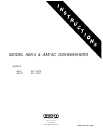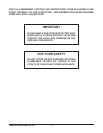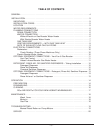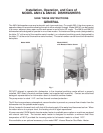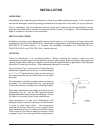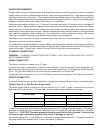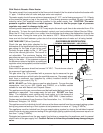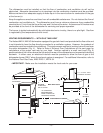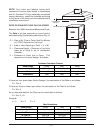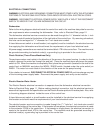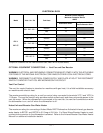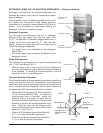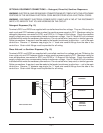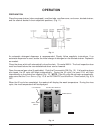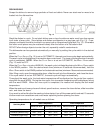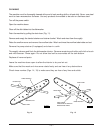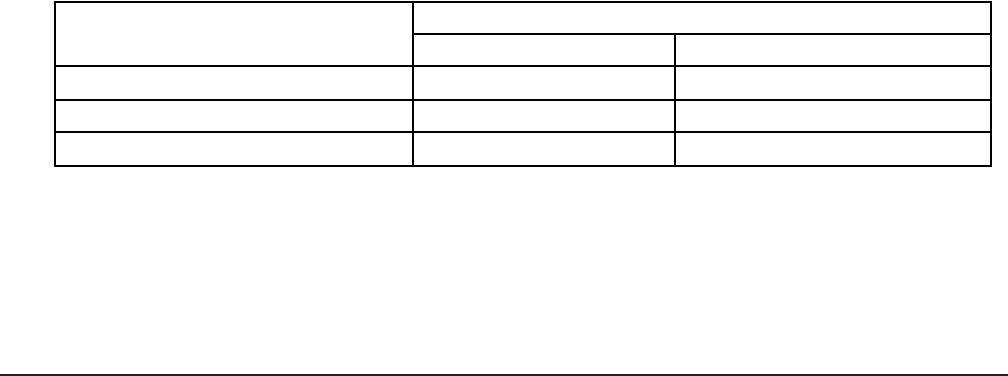
– 6 –
WATER REQUIREMENTS
Proper water quality can improve ware washing performance by reducing spotting, lowering chemical
supply costs, enhancing effectiveness of labor, and extending equipment life. Local water conditions
vary from one location to another. The recommended proper water treatment for effective and efficient
use of this equipment will also vary depending on the local water conditions. Ask your municipal water
supplier for details about local water specifics prior to installation.
Recommended water hardness is 4 – 6 grains of hardness per gallon. Chlorides must not exceed 50
parts per million. Water hardness above 6 grains per gallon should be treated by a water conditioner
(water softener or in-line treatment). Water hardness below 4 grains per gallon also requires a water
treatment to reduce potential corrosion. Water treatment has been shown to reduce costs associated
with machine cleaning, reduce deliming of the dishwasher, reduce detergent usage, and reduce
corrosion of metallic surfaces in the booster water heater and dishwasher.
Sediment, silica, chlorides, or other dissolved solids may lead to a recommendation for particulate
filtration or reverse osmosis treatment.
If an inspection of the dishwasher or booster heater reveals lime build-up after the equipment has been
in service, in-line water treatment should be considered, and, if recommended, should be installed and
used as directed. Contact your Hobart Service office for specific recommendations.
PLUMBING CONNECTIONS
WARNING:
PLUMBING CONNECTIONS MUST COMPLY WITH APPLICABLE SANITARY, SAFETY,
AND PLUMBING CODES.
DRAIN CONNECTION
The drain connection is made using 2" pipe.
If a right hand drain is desired on an electric heat machine, it can be changed from the standard left-
hand by removing the pipe plug from the drain valve and reinstalling it in the opposite end of the drain
valve. On gas heat machines, the drain must be connected on the right side.
If a grease trap is required by code, it should have a minimum flow capacity of 42 gallons per minute.
WATER CONNECTION
A suitable water hammer arrestor should be installed in the water line just ahead of the dishwasher.
Without Electric or Gas Booster Water Heater
The water supply line is connected to the line strainer (Fig. 1) with
3
/4" pipe. A manual shut off valve
and pipe union are required. The required incoming water supply temperature follows:
Sanitizing Mode
Fill and Final Rinse — Water Supply
Minimum Temperature Recommended Temperature
Hot Water Sanitizing 180°F
(82°C)
180°F
(82°C)
Chemical Sanitizing (Normal Duty) 120°F
(49°C)
140°F
(60°C)
Chemical Sanitizing (Light Duty) 120°F
(49°C)
140°F
(60°C)
Proper dishwasher operation requires a flowing pressure of 20 ± 5 psig at the dishwasher. If the flowing
pressure exceeds 25 psig, a pressure reducing valve (not supplied) must be installed in the water
supply line. CAUTION: The water pressure regulator must have a relief by-pass. Failure to use
the proper type of pressure regulator may result in damage to the unit.
A pressure gauge (Fig. 1) is provided for verification of proper water pressure. The water pressure is
monitored when the solenoid valve is open and water is flowing.



